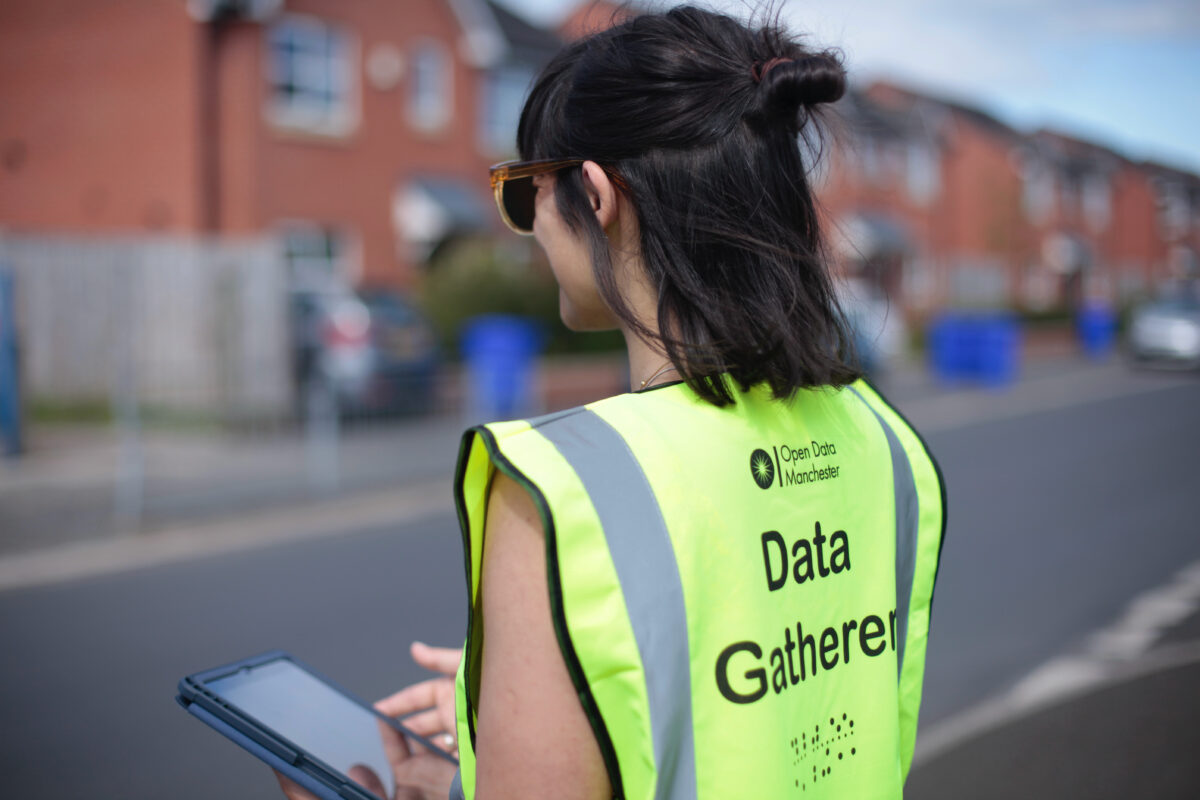This four-part blog series explores Open Data Manchester’s approach to community-led data collection, showcasing our methodology and impact across various projects.
Part 1: Why Community-Led Data Collection?
Introduction
At Open Data Manchester, we believe in democratising data access and collection. Since 2018, our Data For Communities programme has enabled people to find, access, and use data about themselves and where they live. We traditionally delivered this as workshops for local councillors, activists, and residents, and over the next three years we’re going to be expanding the programme.
This work responds to a critical need: despite the vast amount of data generated every day about us and our communities – data that shapes crucial decisions about where resources go, how services are delivered, and how our urban spaces evolve – most of this information remains locked away behind technical barriers, jargon and fragmented systems. As a result, we are seeing a democratic imbalance where decisions are increasingly data-driven, guided by information that community members themselves cannot readily access, interpret or challenge. Data For Communities directly addresses this imbalance by equipping people with the skills, tools, and confidence to access, understand, and use data that affects their lives and communities.
The human element of data
Data often appears abstract, clinical, and separate from our lived experiences. It can feel like something that happens to us, rather than something we actively engage with or help shape. But when people interact with data in ways that directly connect to their daily lives – whether by collecting it themselves, exploring it through accessible tools, or applying it to local challenges – then numbers transform into meaningful insights that reflect real human experiences.
Whether it’s standing roadside counting traffic, mapping neighbourhood safety concerns, or exploring healthcare statistics for your own community, this hands-on engagement creates a tangible connection to information. People develop a sense of ownership and agency when data becomes relevant to their lives and concerns.
This meaningful connection to data drives Open Data Manchester’s participatory approach. We want to help communities engage with data in ways that make sense for them – whether that’s collecting it, exploring it, or questioning what it shows. When people can see their own lives and experiences reflected in the data, they can better understand how to use it. The goal of Data For Communities is to shift how people relate to data, so they can confidently apply it as a practical tool for making positive changes in their neighbourhoods, organisations and everyday lives.
Why community engagement with data matters
This connection between people and data benefits not only individuals, but entire communities. When communities meaningfully engage with data, several important things can happen:
1. Better insights emerge
Local knowledge adds context that official data collection can miss. A dataset might show increased pedestrian activity in an area, but local residents can explain that it’s down to people avoiding a poorly lit path nearby. Insights like these help shape better solutions.
2. People develop data confidence
Many people we’ve engaged start by saying “I’m not a data person,” but soon find themselves exploring maps and datasets with ease, discovering new things about their communities. We’ve seen councillors gain insights about their wards, residents question police statistics, and charity workers uncover previously unknown funding sources. This new found data literacy changes how people see both information and themselves.
3. Advocacy becomes more effective
When residents use evidence they understand and trust, conversations with decision-makers change. Instead of generalised complaints, they can point to specific patterns and propose targeted solutions.
4. Communities strengthen through shared activity
Collecting or exploring data together connects neighbours around common local challenges. Being visible on streets with clipboards often sparks conversations with passersby, while working collectively creates connections that individual data exploration at home cannot match.
5. Perception shifts to action
When people see local challenges through a shared data lens, problems that seemed overwhelming become more defined and addressable. The focus moves from “everything is terrible” to “here’s what we could change first”.
Data in Action
Over the next three blogs, we’ll explore how these principles of community data engagement have to life across different projects.
- In Part 2, we’ll take a look at how the original Data For Communities programme evolved, what tools it introduced, and how participants used newfound data skills.
- Part 3 will explore our participatory mapping approaches, from the playful Joy Diversion meetups, to focussed projects addressing mobility challenges and safety concerns for women and girls.
- Finally, in part 4, we’ll dive into the Data Champions model developed for Our Streets Chorlton, showing how community members became data collectors and interpreters of traffic and air quality information.
These varying approaches – from introductory workshops to in-depth community research – all share a common goal: making data accessible, meaningful and useful for positive change. They also represent the foundation for our expanding Data For Communities programme, which we’re actively developing over the next three years.
We’re looking for partners, participants and collaborators as we grow this work. Where you’re interested in hosting a workshop, developing a community data project, or simply learning more about data in your area, we want to hear from you.

